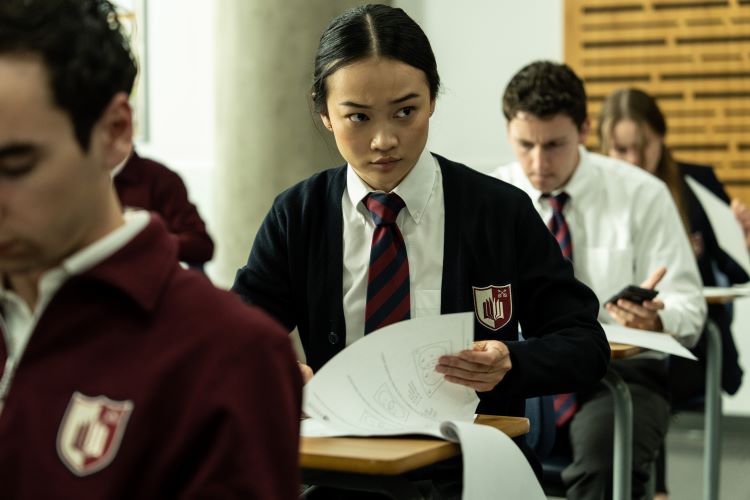
Suspense, sheer fun, and social critique in an academic setting make Bad Genius the perfect film for back-to-school escapist pleasure. Directed by J.C. Lee with a screenplay by Lee and Julius Onah, it’s an adaptation of the enormously successful 2017 Thai film directed by Nattawut Poonpiriya, depicting a high school cheating scam. Transposing the events to Seattle, Washington, Lee spins a thrilling tale that offers a look at the complex relationship between the educational system and socio-economic class in the United States.
Callina Liang delivers an expressive and nuanced performance as Lynn Kang, a brilliant student who is offered a full scholarship to a prestigious private high school. Lynn’s name is actually Mei-Ling Kang, but as any immigrant knows, a name change is usually the safest route to fitting in. Unfortunately, it’s no guarantee. As a scholarship student whose widowed father works in a laundromat, and who brings home-cooked Chinese food to school for lunch, Lynn stands out at school and not in a good way. So, when the appropriately beautiful, blond, and breezy Grace (Taylor Hawkins) befriends her, one can easily imagine Lynn’s happiness, relief, and gratitude. Not quite the scholar that Lynn is, Grace asks Lynn to tutor her in math, and that is where the slippery slope begins. So much of this film hinges on Lynn’s character and motivation, and Liang brings so much depth and charm to her performance that Lynn invites the viewer’s empathy all the way.
Lynn is under immense pressure, most of which began the day she was born. As the child of immigrants, she bears the full weight of her parents’ hopes, dreams, hard work, suffering, and expectations. If she stays the course, she will be the first in her family to attend college. Proud of her talent in math, her father (Benedict Wong) wants her to go to MIT, but Lynn loves music, and secretly wishes to attend Julliard. Wong conveys the love and pride that Mr. Kang feels for his daughter, that become, along with his willing self-sacrifice – working round the clock to make a better life for his daughter, bonds that confine her. Always aware of their limited financial means, Lynn inevitably feels that she owes her father, in every way.
The vast divide between Lynn and her wealthy classmates is ever-present. As Grace’s friend, Lynn becomes part of the sybaritic ease of their lifestyle, making it easy to forget that she does not really belong. When she comes up with a very clever cheating scam, she is hailed by her classmates, making it easy to forget that she is simply, for the moment, useful to them.
The system itself, as Lynn tells Bank (Jabari Banks) – the other smart scholarship student, and along with Lynn, they seem to be the only POC in the school – is rigged. Much has been written about the cultural, gender, and racial bias of the SAT exams, whose scores determine so much of a young person’s future in the United States. Going against the system, cheating the system, is perhaps less immoral if viewed in that way. Perhaps.
What is certain is that the cheating schemes devised by Lynn are elaborate, wickedly smart, and it is thrilling to see these scenarios play out. It’s also extremely satisfying to see an action film with a strong female lead, in which so much of the action is cerebral.
Directed by J.C. Lee; Screenplay: J.C. Lee, Julius Onah; Editing: Franklin Peterson; Camera: Brett Jutkiewicz; Music: Marius De Vries, Matt Robertson; Cast: Benedict Wong, Callina Liang, Taylor Hickson, Jabari Banks, Samuel Brown, Conor Meadows, Sarah-Jane Redmond





